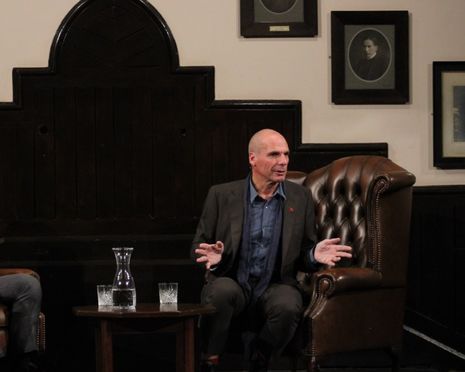World-renowned politician and economist Yanis Varoufakis on the state of the UK economy
The former Greek Finance Minister talks about the incoming recession, digital economies and calls for a bolder financial attitude

Yanis Varoufakis is an international figure. Since teaching at Cambridge in the 1980s, the academic has held posts at universities around the world. And this is even before the event that would change his life dramatically — becoming Finance Minister for Alexis Tsipras’ Syriza government in 2015.
The game-theory expert’s political career has continued with great steam since those infamous negotiations during the Eurozone crisis, where he voted against the European bailout terms agreed by the Syriza party. He seemingly offers his economic insight and radical sentiments to all those willing to listen — indeed proving itself to be an audience that spans the world over. Varoufakis has been re-elected to the Hellenic Parliament, seen his party begin a campaign in Germany and headed a general global effort to realise a new “transnational” politics.
“Parliament is soul destroying”
Our conversation would similarly snake from an immense variety of economic, political and sociological topics. First however, as he returns to talk at the Union for the third time in four years, I thought it necessary to ask whether he has a special fondness for this city — which would be great praise from a man as well travelled as he. I added too whether he felt his politics particularly resonates with students in the debating chamber. He explained that in Cambridge he feels “utterly at home, especially after 2015 when I inadvertently, genuinely inadvertently, left academia for politics. Coming back to universities, and particularly this one, is an oasis in the desert.”
He adds that “Parliament is soul destroying. Imagine for a moment you are sitting at a front bench, and you come up with a fantastic argument, and then your opposite number suddenly thinks ‘Ah! That’s a good point!’. If he says so, he has lost his job. Whereas in a university the whole point is to let the ideas clash and learn from one another.”
That is not to say that he withholds criticism of the university. He dislikes a tendency he sees to demand definitive conclusions from Economics students — where departments “have lost touch with real existing capitalism”. Instead, he celebrates the beautiful “indeterminism” of macroeconomics, where you can unashamedly assert “you know what- I don’t know!” With radical policy, he implies, it necessitates that you must be willing to take risks outside of the familiar model (in his last Union talk he expressed unlikely common ground with Michael Gove, who famously stated “[we] have had enough of experts”). He calls this process the “mathematization” of economics, where “there lies a structural institutionalised inability to say anything about capitalism… my heart bleeds”.
I turn our attention to the UK economy. With the IMF saying last week that Britain is the only leading economy likely to slide into recession this year, and the Bank of England adding that, though shorter than expected, a recession is due, what advice would he give to the present government?
“[Liz Truss] is verging on a sad variety of madness”
“It is a result of a decade or two of extremely low investment, during a period of exuberate financialization. The City of London, as far as I’m concerned — though it is an unpopular opinion — is a drag on the British economy… Investment, this is the one pillar of any genuine growth strategy that has been missing in the UK for decades”
Never afraid to tackle large, sweeping topics in a matter of moments, he cites Margret Thatcher’s “de-industrialisation” of the UK economy as instigating our troubles, where money was moved into the City. This is a long way back to reach for an answer to my question, but one which reflects the boldness of Varoufakis’ approach. As a counter-example to his emphasis on investment, he lambasts the tactics of Rishi Sunak and Jeremy Hunt who are “trying to stablise prices through austerity… Even if it stabilises prices, you do so by killing off investment further. If you are a businessperson, why would you invest in an economy where aggregate demand is going to be depleted as a result of austerity?”
Seeking further comment on recent happenings, I ask his opinion on Liz Truss’ so-called attempt at “trickle-down economics”. From his latest Guardian article, it is easy to discern that he is not a fan- though that, by now, should be clear. I therefore, perhaps insincerely, query his opinion on her recent claim in The Spectator that she was ousted by “the left-wing economic establishment”? Though I suspected the answer, his frankness still comes as a surprise:
“She is verging on a sad variety of madness. To describe the treasury as ‘the left-wing establishment’ and in the same breath to blame the markets for imposing a left-wing agenda! The whole point about Thatcherism, which was supposed to be represented [by that government], is that ‘the markets know best’ and ‘there is no alternative’. What is she taking…?”
We conclude by talking about digital economies, and the thesis he developed from watching the dynamic and dizzying movements of game economies. “We are moving away from capitalism”, he remarkably suggests, “there is capital… [but] there is no division between those who own the capital goods and those who supply their labour to those who own the capital goods.” It is from here that he has conceived his new project: a book called ‘Techno-Feudalism’. Once more, audacious and memorable statements remind the listener why he captured the imagination of so many Europeans in 2015, and why he continues to draw attention around the globe. The Union no doubt looks forward to his next visit.
 News / Cambridge academics sign open letter criticising research funding changes22 February 2026
News / Cambridge academics sign open letter criticising research funding changes22 February 2026 News / Supporters protest potential vet school closure22 February 2026
News / Supporters protest potential vet school closure22 February 2026 News / Student and union protesters hold ‘Trans Liberation Solidarity Rally’ 24 February 2026
News / Student and union protesters hold ‘Trans Liberation Solidarity Rally’ 24 February 2026 News / Union speakers condemn ‘hateful’ Katie Hopkins speech14 February 2026
News / Union speakers condemn ‘hateful’ Katie Hopkins speech14 February 2026 News / Hundreds of Cambridge academics demand vote on fate of vet course20 February 2026
News / Hundreds of Cambridge academics demand vote on fate of vet course20 February 2026











